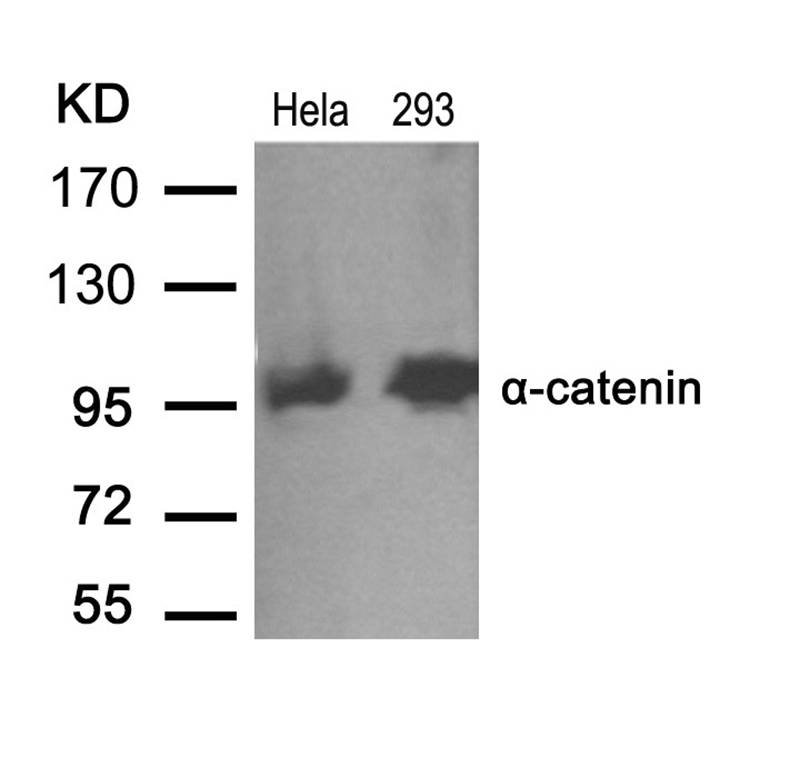
| WB | 咨询技术 | Human,Mouse,Rat |
| IF | 咨询技术 | Human,Mouse,Rat |
| IHC | 咨询技术 | Human,Mouse,Rat |
| ICC | 技术咨询 | Human,Mouse,Rat |
| FCM | 咨询技术 | Human,Mouse,Rat |
| Elisa | 咨询技术 | Human,Mouse,Rat |
| Aliases | Cadherin-associated protein; Alpha E-catenin; NY-REN-13 antigen |
| Entrez GeneID | 1495; |
| WB Predicted band size | 100kDa |
| Host/Isotype | Rabbit IgG |
| Antibody Type | Primary antibody |
| Storage | Store at 4°C short term. Aliquot and store at -20°C long term. Avoid freeze/thaw cycles. |
| Species Reactivity | Human,Mouse |
| Immunogen | Peptide sequence around aa. 639~643 (D-D-S-D-F) derived from Human a-catenin. |
| Formulation | Purified antibody in PBS with 0.05% sodium azide. |
+ +
以下是关于a-catenin(Ab-641)抗体的3篇参考文献的简要概括:
1. **"α-Catenin acts as a tumor suppressor in E-cadherin-negative basal-like breast cancer"**
- **作者**: Schlegelmilch, K. et al. (2011)
- **摘要**: 研究使用Ab-641抗体通过免疫组化发现α-catenin在基底样乳腺癌中表达缺失,其缺失与E-cadherin无关,且能独立抑制肿瘤侵袭和转移。
2. **"Mechanical regulation of α-catenin in cell-cell junctions"**
- **作者**: Yao, M. et al. (2014)
- **摘要**: 通过Western blot(使用Ab-641)和原子力显微镜,证明α-catenin在机械力作用下构象变化,增强细胞间连接稳定性,调控细胞粘附强度。
3. **"α-Catenin deficiency disrupts adhesion and induces pro-metastatic actin cytoskeleton in intestinal tumors"**
- **作者**: Benjamin, J.M. et al. (2010)
- **摘要**: 利用Ab-641进行免疫荧光分析,发现肠癌中α-catenin缺失导致细胞粘附破坏,促进细胞骨架重组和转移,揭示其在肿瘤抑制中的关键作用。
a-catenin (Ab-641) is an antibody targeting α-catenin, a critical component of cell-cell adhesion complexes. α-catenin belongs to the vinculin superfamily and plays a pivotal role in linking the cadherin-catenin complex to the actin cytoskeleton, thereby regulating adherens junction stability and mechanotransduction. It exists in two major isoforms (αE-catenin, expressed in epithelial cells, and αN-catenin, neuronal-specific). The antibody Ab-641 typically recognizes a conserved epitope, often within the C-terminal domain of αE-catenin, which mediates its interaction with β-catenin and actin-binding proteins.
This antibody is widely used in research to investigate epithelial integrity, cell polarity, and tissue morphogenesis. Dysregulation of α-catenin is implicated in cancer progression, as loss of its expression correlates with increased cell motility, metastasis, and epithelial-mesenchymal transition (EMT). In experimental applications, Ab-641 is employed in techniques like Western blotting, immunofluorescence, and immunohistochemistry to assess protein localization, expression levels, or junctional assembly in cell lines and tissue samples. Validation often includes testing in α-catenin knockout models or siRNA-treated cells to confirm specificity. Its utility extends to studying developmental biology, wound healing, and diseases like inflammatory disorders or carcinomas, where cell adhesion dynamics are perturbed. Proper controls, such as tissue-specific expression patterns (e.g., strong signal in epithelial layers), are essential for data interpretation.
×